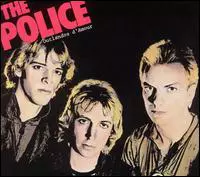Simultaneously one of punk's most hated and adored bands, the Police were one of the first punk (influenced) bands to be accepted into mainstream music. Eschewing the nihilistic and antisocial sentiments of the first wave of punk, the police utilized early punk's unique sound to create songs with generally radio-friendly topics.
So, when the police released their first album, Outlandos d'Amour, in 1978, it helped bridge the gap between revolution and retail, with bastardized reggae as support columns. Sonically, Outlandos d'Amour is 10 lean, high-pitched cuts. With only three instruments and Sting's squeal, the band relays on pounding drums and a thick bass to round out the sound. And that's not a bad thing. The songs on this album strip rock down to its essence and then amplifies these characteristics.
But, while stripping rock to its most basic structure, the Police also interpret contemporary reggae rhythms into the formula. However, the Police version of reggae comes off as a four-year-old trying to draw the Mona Lisa. No, it's not as good as the original. But, it has its charm and there are even some things there that weren't there in the first place. This is most evident on the killer cut, "So Lonely," which is Outlandos' longest song and rightfully so. When the Police let the rhythm of white reggae drive the song, all while pushing it forward with a quick tempo, just what made the Police so special and unique is evident.
But, while the sound and lyrics of the Police was financially profitable, the band can't quite decide if they want to actually "say" something or if they just want to "play" something. "Born in the 50's" laments how Sting's generation can't be understood by those who were in WWII, and "Be My Girl - Sally" vividly describes the band's fondness for blow-up dolls. And of course, there's the song which can be found on classic rock, hard rock, and even adult contemporary radio stations, "Roxanne." This song, which begs a prostitute to quit her profession and fall in love, may be included to function as so many punk songs before, and say "forget your AM radio, this is what life for some people is really like." But, as with all semi-political Police songs, none of the topics or explanations ever delve into truly dangerous or controversial territory, relegating them to be slightly edgy pop songs.
Regardless of the political and financial implications the music of the Police leaves behind, Outlandos d'Amour is one fine album. Never again would the Police achieve such angular, lean sounds pulsating with energy. Even more so, pop music as a whole seldom saw such energy-driven, punk-influenced music on its charts. Punk music would seldom see such a band with pop sensibilities critically popular. If this is a good or bad thing is irrelevant because this is one heck of a fine middle ground.
